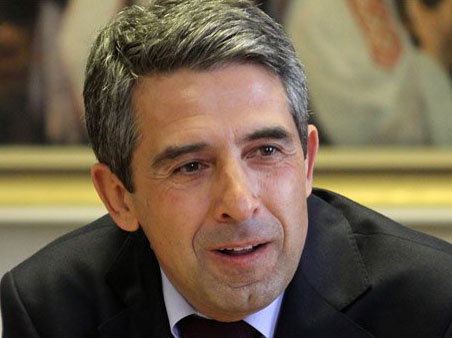Baku, Azerbaijan, Apr. 28
By Seymur Aliyev - Trend:
No country in the world can cope with contemporary problems alone, Bulgarian President Rosen Plevneliev said.
He made the remarks during the 3rd Global Shared Societies Forum in Baku April 28.
"We will be able to overcome the challenges we face only with cooperation, respect and the rule of law and policy based on the values," said the president. "Regardless of the political will or the military power, no country can cope with these problems by itself."
It is necessary to resolve the current problems, but not to leave them for the next government or the next generation, according to Plevneliev.
The number of crises throughout the world is currently at its record high, he said.
"The challenges we are facing are very serious. We can't afford to wait or transfer this problem to the next generation," he said. "We should make a decision and act."
He added that currently, the solution of many problems is postponed or takes long time.
During the Iraqi crisis, over ten years ago, the UN succeeded in creating a humanitarian corridor in several days, the president said. "But today, this took over three years during the Syrian crisis and in fact, a safe corridor hasn't been created."
Bulgarian president listed the world's main problems and challenges that need an immediate solution, adding that the first task is to ensure the rule of law.
"It is possible to achieve peace when there are rules applicable to everybody," he said, adding that there is no peace without rules and it is necessary to create an effective mechanism that will ensure the rule of law.
Furthermore, Plevneliev said that it is difficult to guarantee the key values even in the EU, albeit there has been created a dialogue between all the states in order to ensure the rule of law.
Early detection of crisis situations is the second important task, said Plevneliev. "We reveal the possible crisis situation in many parts of the world. But the use of weapon is not an argument, it is the lack of the argument, the last option."
"We shouldn't wait the start of the use of weapon in the settlement of a crisis in order to take measures," Bulgarian president added.
He said it is necessary to create a system of early detection of the crisis situations that could be activated when these common values are violated.
Meanwhile, it is necessary to work on the problems of migration, climate change, terrorism, threat to security, Bulgarian president said, adding that a comprehensive approach is needed to resolve these problems.
Another problem in the modern world is that the West and Russia are opponents again, said Plevneliev. Although no one wants war, the peace that exists between the sides is a cold, patched-up peace.
Another problem is related to frozen conflicts and their number is growing, said Plevneliev, adding that the eastern Ukraine can be the next.
"Is this what the residents of these regions want? Look at the territories of other frozen conflicts. Do people live there better? Is their freedom and security ensured? Who will invest in the zone of a frozen conflict?" said the president.
"If we think about the people, we should oppose the dangerous trend of keeping the countries and regions in unstable conditions," he added.
Plevneliev said that it is necessary to draw a clear line between nationalism and patriotism. Moreover, today, nationalism is an urgent problem in Europe and is directed against migrants, he added.
Bulgarian president added that another problem is related to the global problems and global principles. Currently, Russia relies on its sphere of interests on its periphery, he said.
"We do not want to return to the time when the major states were determining their zones of influence," said Plevneliev.
The 3rd Baku Global Shared Societies Forum kicked off in Baku on April 28.
The Azerbaijani State Committee for Work with Diaspora and the Nizami Ganjavi International Center organized the event.
The topic of the forum is "Building Trust in the Emerging World Order".
The event is to discuss topics and issues related to the fight against terrorism, ethnic and religious conflict resolution, democracy development, education reform, and environment preservation.
The forum provides a space for current and ex-presidents, prime ministers, ministers and leading scholars and experts to assess the current state of the world and the most pressing threats to international security and peace, and to elaborate concrete steps for today's leadership to overcome these divisions.
Edited by CN






